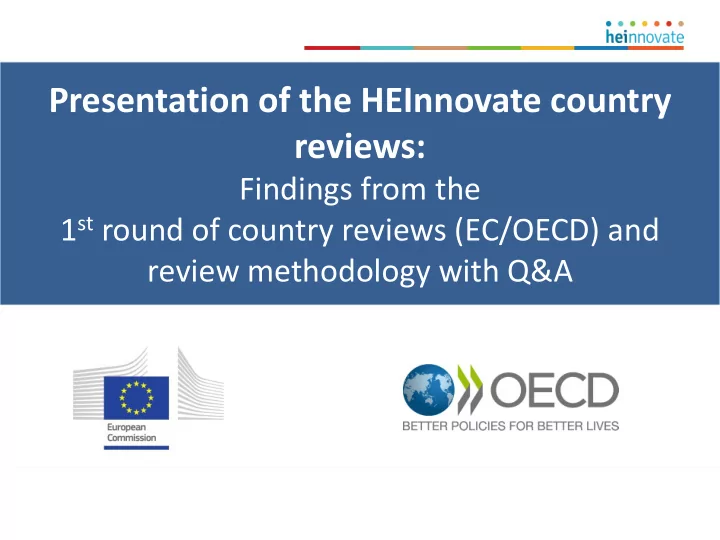

Presentation of the HEInnovate country reviews: Findings from the 1 st round of country reviews (EC/OECD) and review methodology with Q&A
Objectives of the HEInnovate country reviews • Assist policy makers, HEI leaders and staff to identify and act upon opportunities, enablers and challenges to support the development of entrepreneurial & innovative HEIs • Identify and analyse good practices in public policies and HEI actions • Disseminate learnings and promote transnational collaboration
Key findings from the 1 st round of reviews • The “entrepreneurial agenda” of HEIs has three key pillars: ( i) developing an entrepreneurial mindset of students and staff, (ii) supporting start-ups, (iii) active role in local development • Effective policy frameworks emerge from a strong long-term collaboration of different policy portfolios including education, labour market and skills, research, innovation, enterprise, and regional development. • The combination of human resource development, incentives and support structures is the central lever to mobilise academic staff for greater impact.
Key findings from the 1 st round of reviews • Interdisciplinary approaches to education and research work far better in progressing on an entrepreneurial agenda than a silo setup. • Students need incentives and support to engage with the entrepreneurial agenda (e.g. diploma supplements , formal & informal activities, flexibility for student start-ups to reduce dropout risk • Innovative & entrepreneurial HEIs are strongly linked with other organisations – locally, nationally, internationally • Synergies between the internationalisation & entrepreneurial “agendas” are crucial to attract students and staff, and KE
Key findings from the 1 st round of reviews • Measuring impact need further attention. Some relevant metrics that are easy to collect are numbers of start-ups and spin-offs, and technology transfer through contract research and intellectual property rights. • Much harder to capture are the different forms of engagement with the wider world, such as community research, service learning, or the impact of international students on the internationalisation activity of local firms. • Much more information is needed on practices, outcomes and the underlying processes within HEIs and partner organisations to fully conceptualise impact.
Review methodology – key elements • Review Steering Group (different Ministries and their national bodies, HEI umbrella organisations, accreditation agency, etc.) • Kick-off meeting with key stakeholders of the higher education system • Preparation of background report by the national expert, including HEI profiles • Study visits to HEIs • HEI Leader Survey (average response rates per country 50%, IRE: 86%) • Presentation of summary report with key review findings and preliminary recommendations for discussion with key stakeholders of the higher education system • Launch event – OECD/EU Supporting Entrepreneurship and Innovation in Higher Education in Croatia
Review Steering Group Established by the Ministry for Science and Education. Role in country review: • Provides information for the Background Report • Members are interviewed during the study visit • Review team will provide feedback to MSE and the review steering group on the last day of the study visit • Provide comments on summary report • Can requests policy inputs in between the summary report and the full review report • Provide additional inputs (if needed) for final review report • Comment on the final review report
Study visits to selected HEIs Aim: In-depth analysis of strategy, current and planned practices; examine good practices, understand what works and why, give an “external view” on what could be improved and how How: 1-day intensive visit with interviews and focus groups with key HEI-internal and external stakeholders (i.e. Rectors board, deans, staff, students, start-ups, alumni, key local partners) Preparation: Use of HEInnovate Group Function facilitated by national expert; proposal of a 1-day agenda (example: IRE ~ 400 interview partners for 6 HEIs), organisation of interviews
HEI Leader Survey Aim: collect data on current and planned practices in all seven HEInnovate dimensions, establish baseline for HEIs in Croatia Preparation: translation of questionnaire into Croatian language How: online questionnaire – entrepreneurship support are self-containing sections in order to reduce self-selection bias (i.e., avoid that ”entrepreneurial” HEIs are more likely to respond than other HEIs) Invitation is sent to Rector’s offices, reminder emails; a group of people can complete the survey (multiple log-ins possible); average total completion time 35 minutes
HEI Leader Survey – data examples
Launch event – example Ireland October 2017
Recommend
More recommend